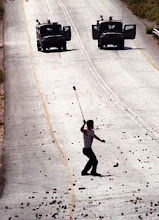Most of my week here in Thessaloniki has been surprisingly not-Greek oriented. I've been learning more about the past (and present) conflicts in the Balkans rather than conflicts here in Greece. Well, we do what we can. So much of the news has not been dedicated to the general strikes happening around the country, but rather to the Greek Paris Hilton: Julia. (If you do a Google search of "Julia Greece", you can download the singer's porn video that is so shocking Greece.)
Thessaloniki is not the picturesque Greek I expected, or that we see in the movies or travel guides (duh). It's a fairly large port city whose streets resemble Barcelona's L'Eixample neighborhood, albeit with narrower streets and far more traffic. And it's cold now, the wind really bites into your face as you walk down Nikis (Victory) Boulevard, past the statue of Alexander the Great (one dispute Greece has with neighboring Macedonia is that the name Macedonia is part of Greek heritage and can't be used by a largely Slavic population... boring) and the "White Tower". The White Tower is the symbol of Thessaloniki. It was an Ottoman Empire-age prison whose stone walls used to be stained red with the blood of executed prisoners who were hung from the cornice. It was whitewashed after the collapse of the Ottoman Empire.
One thing I miss about the Middle East was not having to do street battle with my arch-nemesis: dog shit. It's bountiful here.
 '
'I'm reading a book right now called "Unholy Alliance", about Greece's alliance with Milosevic's Serbia. Greece was the only NATO and EU-member nation that supported (and very much openly so) the Serbs during the Balkan wars. The author, reknowned Greek journalist Takis Michas, claims that this alliance was due in part to religion and a shared sense of history. Both Serbs and Greeks are Orthodox, and viewed the wars as an attack by the Muslim Crescent (with Greek's arch-rival, Turkey, somewhere in the background pulling the strings) and the Catholics (the Croats, Vatican, etc.). Serb chetniks helped defend against Nazi occupation during WWII. And something about ancient kingdoms allying at the border of the Ottoman and Hapsburg empires. Greek Orthodox priests visited and prayed with Greek paramilitary units working alongside Serb Chetnik forces, the same forces who committed some 90% of human rights violations during the war. In short, Greece likes Serbia.
In setting up an understanding of this alliance, Michas describes early in his book three facets of Greek ethnic nationalism (which he opposes to civic nationalism, or being Greek based on universal citizenship rights). Religion (Greeks hold on to the uniqueness of their Greek Orthodoxy), shared geneology (the Hellenic culture) and language (Greek).
I mentioned to my friend that this type of nationalism, in my opinion, was similar to that experienced in Israel, where language, shared geneology and religion plays a big factor in "Israeli" collective identity. If you are not able to fully enjoy these three qualities, you are not really Israeli. Just ask any Arab citizen of Israel. Al-Jazeera reported recently on Israel's immigrants, many of them children born and bred in Israel, who may be deported at the end of the summer back to their countries of origin.
My friend didn't much like the comparison, but questioned how someone who wasn't "really Greek" could become a citizen; with so few Greeks (11 million), allowing so many immigrants in would make Greece "less Greek". Apparently, she is on the conservative side of the debate that is raging over the PASOK (socialist) government's proposal to grant citizenship to all their immigrants. A good article by Douglas Muir points out that even the current Archbishop of Athens (the head of the Greek Orthodox Church), is actually an "Arvanite", ethnic Albanians incorporated into the Greek state at the time of independence. No one even realizes this, and he points it out to show that Greek culture is not static and is capable of admitting many cultures and still retaining its identity.
To be fair, proportionately, in seems as though Greece is taking in the lion's share of undocumented workers. For a cash-strapped country, that can cause a heavy burden. (UPDATE: Thanks to Carmen for pointing out the idiocy of this previous statement.In her words, "anti immigrant movements are racist and always have been." I agree and pardon the previous statement). I remember as I crossed the Turkey-Greece border, there was one black youth on our bus. As soon as we entered Greece, I knew there would be problems when the border police started looking at him sternly. He was taken off the bus and detained, on the suspicion that his passport was fake.
Of course, not everyone shares my friend's point of view. Last year, after a Pakistani youth died in police custody, people took to the streets and battled the police. At least among the anarchists, it was seen as another example of the police brutality that caused massive rioting in December 2008. On March 20th, there will be demonstrations held for allowing immigrants - children especially - to become citizens.
Greek society seems to be super dynamic, and changing everyday. The strikes called against the EU and the privatization schemes as a response to the debt are constants. There was an uproar over a recent suggestion by German MPs that Greece should sell some of their islands, an overtly imperialist and patronizing statement that sent Greeks running around rumoring a second German occupation of the nation. This Thursday is another strike here in Thessaloniki and I'll be sure to be there.
Meanwhile, popular 'expropriations' of food are still being carried out against large supermarket chains, and in Robin Hood style, the goods are being distributed in needy communities. Enjoy the video!


No comments:
Post a Comment